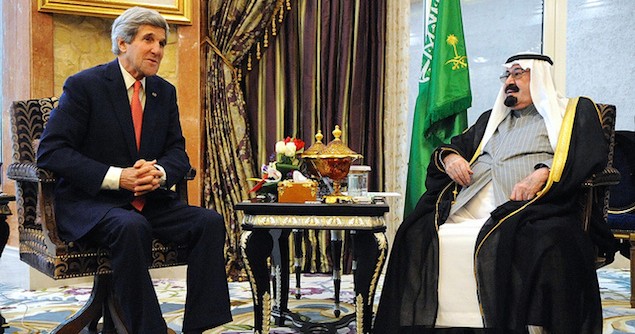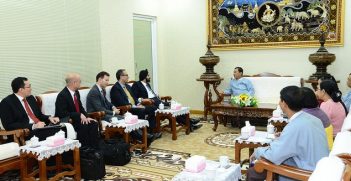Riyadh’s Response to the Islamic State Threat

Saudi Arabia is pursuing a range of political, economic and security strategies at the domestic, regional and international level in an attempt to counter the threat posed by the Islamic State.
Domestic political and security strategies
For the Saudi monarchy, the threat posed by the Islamic State (IS) is not just a security issue; it is also political. As the custodian of the two holy mosques, Saudi Arabia’s religious legitimacy is intrinsically linked to its domestic security. By declaring themselves an ‘Islamic State’, the extremist organisation formerly known as the Islamic State of Iraq and ash Sham has directly challenged the House of Saud’s religious legitimacy and leadership of Sunni Muslims, and thereby the security of Saudi Arabia itself.
As such, Riyadh has responded by stepping up its political messaging against the IS as well as against terrorism. For example, in August, Saudi Arabia’s Grand Mufti Abdul Aziz al Sheikh proclaimed that extremism and terrorism “are not in any way part of Islam, but are enemy number one of Islam”. Al Sheikh, who is appointed by the Saudi king, also warned fellow preachers against encouraging young men to fight in Syria and Iraq.
Riyadh is supporting this political messaging by strengthening a range of domestic security laws, beginning with the February royal decree imposing up to a 20 year jail term for any Saudi national attempting to travel abroad to fight. Riyadh then updated its list of banned terrorist organisations, adding the IS and the al Qa’eda-linked Jabhat al Nusra.
The implications of these strengthened security policies are evident. In May, Riyadh arrested 62 people allegedly connected to regional terrorism–including at least 35 Saudi citizens. In July, four Saudi nationals were sentenced to jail terms for allegedly attempting to travel to Iraq to join terrorist organisations. Most recently, on 1 September, 17 men were sentenced to jail terms ranging from two to 26 years for planning or coordinating travel to regional conflicts, or attempting to turn the public against the state. The next day, Saudi’s Interior Ministry arrested 88 more people on terrorism charges.
These domestic political and security strategies are Saudi’s attempt to stem public support for the IS and the foreign fighter flows of Saudi nationals who are attracted to the regional conflict. Saudi nationals are already estimated to make up the second largest contingent of Arab foreign fighters in the ranks of the IS, with approximately 2,500 nationals. With these numbers, Riyadh is, understandably, concerned over the possibility that radicalised and networked Saudi nationals could return to Saudi Arabia from Iraq or Syria, intent on committing terrorist activities against the monarchy.
Regional political and security policies
Riyadh is also adopting a more holistic regional strategy in the face of the IS threat, based on new political tactics and toughened security policies. The need for a revised regional strategy is probably in response to Riyadh’s haphazard Syria policy, which achieved limited results and possibly exacerbated the IS threat.
Key to this new strategy is King Abdullah’s July appointment of Prince Khaled bin Bandar as Saudi Arabia’s new intelligence chief. Prince Khaled is an experienced security leader who could take Saudi Arabia in a different direction to that of his predecessor, Prince Bandar bin Sultan.
Riyadh’s next tactical move was King Abdullah’s 12 August announcement congratulating Iraq’s new prime minister, Haider al Abadi on his new appointment. While Riyadh is pleased with the removal of Iraq’s former prime minister, Nouri al Maliki–who Riyadh alleges is an Iranian puppet–it is atypical for Riyadh to applaud the election of another Shi’a-led government in Baghdad. But Riyadh probably recognises the new geopolitical realities in Iraq, and would understand that a more inclusive Iraqi government could regain some Sunni support for Baghdad which, in turn, could help deter some Sunni tribes supporting the IS.
Closely linked to this political move is Riyadh’s September announcement that it plans to reopen its embassy in Iraq once the security situation improves. Riyadh has not had a diplomatic presence in Iraq since 1990, so this announcement is likely Riyadh’s acknowledgement that it needs more political weight in Iraq–to better understand the regional threat posed by the IS as well as directly counter Iranian influence.
Supporting Riyadh’s revised political strategies are several new regional security initiatives. Early this month, Riyadh announced the construction of a five-layered, 900 kilometre security fence along Saudi Arabia’s north-eastern border with Iraq. The new fence will be supported by command and control centres, rapid response centres and monitoring towers. Additionally, in July, Riyadh deployed up to 30,000 troops along this border as a symbolic show of force.
Lastly, on 11 September Riyadh announced that it will host a training facility for up to 10,000 Syrian rebel fighters who will combat both IS forces and Syrian President Bashar al Assad’s regime. While Saudi Arabia was always likely to continue supporting the armed opposition in Syria, hosting a regional training facility is a step up in Riyadh’s commitment.
International political and security policies
Lastly, Saudi Arabia is adopting a range of multilateral political and security agreements in response to the IS threat.
Over the past four weeks, Riyadh has participated in a number of security discussions with regional and international stakeholders, culminating in hosting a conference in Jeddah on 11 September that was attended by US Secretary of State John Kerry. The Conference–which was devoted specifically to regional terrorism–was also attended by delegates from Egypt, Jordan, Turkey and the Gulf Cooperation Council.
While Riyadh remains wary of Washington’s contemporary Middle East policies and promises, it is publicly supporting US’ renewed focus to “degrade and ultimately destroy” the Islamic State, and is committed to working with the US to cut off the flow of money and foreign fighters to the extremist organisation.
Following the Jeddah conference, Saudi Foreign Minister Saud al Faisal claimed, “there is no limit to what the Kingdom can provide”. Indeed, the Kingdom is backing its international calls with significant financial contributions. In July, Saudi Arabia provided the United Nations (UN) US$500 million to support humanitarian relief efforts in Iraq. This donation–one of the largest ever single contributions to UN humanitarian relief–was further supported by a US$100 million contribution to the UN’s Counter-Terrorism Centre to provide “the tools, technologies and methods to confront and eliminate the threat of terrorism”.
Conclusion
As highlighted above, Riyadh is undergoing a variety of political and security strategies at the domestic, regional and international level in response to the threat posed by the IS. While the effectiveness of some of these strategies will differ, it nonetheless underlines Riyadh’s increasing concern over regional instability and its need to adopt new, and more considered, political and security strategies.
Rohan Worsdell is a subject matter expert in Middle East and North Africa security issues. He has completed a Master’s degree in Middle East and Central Asia studies at the Australian National University, as well as postgraduate studies in International Relations and Terrorism, Counter-Terrorism and Security Studies.





